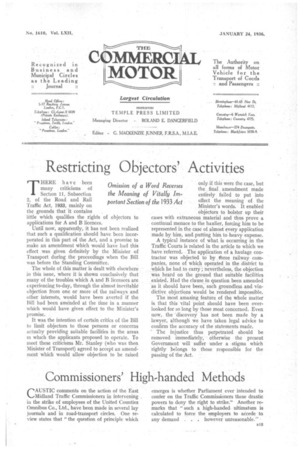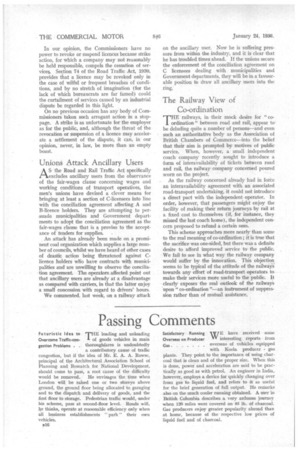Commissioners' High-handed Methods
Page 25

Page 26

If you've noticed an error in this article please click here to report it so we can fix it.
CAUSTIC comments on the action of the East Midland Traffic Commissioners in intervening in the strike of employees of the United Counties Omnibus Co., Ltd., have been made in several lay journals and in road-transport circles. One review states that "the question of principle which emerges is whether Parliament ever intended to confer on the Traffic Commissioners these drastic powers to deny the right to strike." Another remarks that "such a high-handed ultimatum is calculated to force the employers to accede to any demand . . however unreasonable." In our opinion, the Commissioners have no power to revoke or suspend licences because strike action, for which a company may not reasonably be held responsible, compels the cessation of services. Section 74 of the Road Traffic Act, 1930, provides that a licence may be revoked only in the case of wilful or frequent breaches of conditions, and by no stretch of imagination (for the lack of which bureaucrats are far famed) could the curtailment of services caused by an industrial dispute be regarded in this light.
On no previous occasion has any body of Commissioners taken such arrogant action in a stoppage. A strike is as unfortunate for the employer as for the public, and, although the threat of the revocation or suspension of a licence may accelerate a settlement of the dispute, it can, in our opinion, never, in law, be more than an empty boast.
Unions Attack Ancillary Users
AA S the Road and Rail Traffic Act specifically .i.excludes ancillary users from the observance of the fair-wages clause concerning wages and working conditions of transport operatives, the men's unions have devised a clever means for bringing at least a section of C-licensees into line with the conciliation agreement affecting A and B-licence holders. They are attempting to persuade municipalities and Government departments to adopt the conciliation agreement as the fair-wages clause that is a proviso to the accept ance of tenders for supplies. .
An attack has already been made on a prominent coal organization which supplies a large number of councils, whilst we have heard of other cases of drastic action being threatened against Clicence holders who have contracts with municipalities and are unwilling to observe the conciliation agreement. The operators affected point out that ancillary users are already at a disadvantage as compared with carriers, in that the latter enjoy a small concession with regard to drivers' hours.
We commented, last week, on a railway attack on the ancillary user. Now he is suffering pressure from within the industry, and it is clear that he has troubled times ahead. If the unions secure the enforcement of the conciliation agreement on C licensees dealing with municipalities and Government departments, they will be in a favourable position to draw all ancillary users into the ring.
The Railway View of Co-ordination
HE railways, in their mock desire for " co1 ordination " between road and rail, appear to' be deluding quite a number of persons—and even such an authoritative body as the Association of British Chambers of Commerce—into the belief that their aim is prompted by motives of public service. When, however, a small independent coach company recently sought to introduce a form of interavailability of tickets between road and rail, the railway company concerned poured scorn on the project.
As the railway concerned already had in force an interavailability agreement with an associated road-transport undertaking, it could not introduce a direct pact with the independent operator. In order, however, that passengers might enjoy the facility of making their return journeys by rail at a fixed cost to themselves (if, for instance, they missed the last coach home), the independent concern proposed to refund a certain sum.
This scheme approaches more nearly than some to the real meaning of co-ordination ; it is true that the sacrifice was one-sided, but there was a definite desire to afford improved service tothe public. We fail to see in what way the railway company would suffer by the innovation. This objection seems to be typical of the attitude of the railways towards any effort of road-transport operators to make their services more useful to the public. It clearly exposes the real outlook of the railways upon " co-ordination "—an instrument of suppression rather than of mutual assistance.




















































































